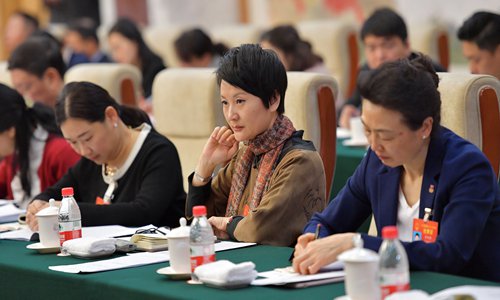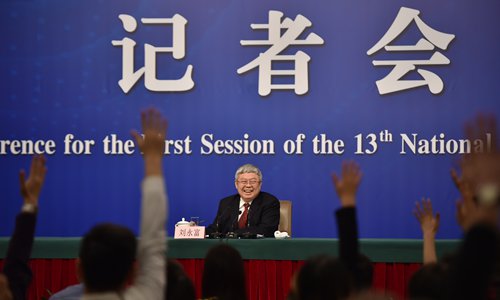HOME >> CHINA
China to delay two sessions to focus on virus control
By GT staff reporters Source:Global Times Published: 2020/2/18 0:13:39
Postponement of biggest political gathering no impact on central govt’s agenda

A delegation from East China's Zhejiang Province holds a plenary meeting to review the draft of a new Foreign Investment Law during the two sessions. Photo: VCG
China is considering delaying the annual meeting of its top legislative body and top political consultative body, known as the two sessions, also the biggest political gatherings of the year, which is in line with the expectation considering the seriousness of the epidemic outbreak, which has led to over 70,000 infections nationwide. Analysts predicted the event might be delayed to late March.
Worries have been surfacing on the internet that China's national two sessions this year might be affected by the coronavirus epidemic, which has caused the delay of local "two sessions" in two provincial and 16 city-level administrations and halt of a large number of cultural and sports events.
The Standing Committee of the 13th National People's Congress (NPC), China's top legislature, will convene its 16th bi-monthly session on February 24 in Beijing, which is expected to deliberate a draft decision to postpone the 3rd annual session of the 13th NPC.
The Chinese People's Political Consultative Conference National Committee held a meeting on Monday in Beijing to deliberate the postponement of the annual session of China's top consultative body.
Zhuang Deshui, deputy director of the Research Center for Government Integrity-Building at Peking University, told the Global Times that the decision will be made based on the current epidemic prevention and control work as it requires all officials to work at the frontline.
The proposal to postpone indicates that the central government puts epidemic prevention and control work as its top priority, showing its highly responsible attitude not only to the Chinese people but also to the work, Zhuang said.
Postponing the national two sessions is very unusual in the history of the Party, which has not been seen since the country's reform and opening-up reform.
The epidemic control work needs to restrict the flow of people. Considering there will be more than 5,000 NPC deputies and CPPCC members, plus staff to ensure the services support for the two sessions, such an event will lead to a relatively concentrated people flowing to Beijing, putting pressure on the prevention and control work in the capital city, Wang Guangfa, a respiratory expert at Peking University First Hospital, told the Global Times.
"Such events will lead to a concentration of people flowing into Beijing, putting pressure on the prevention and control work in the capital city," he said.
The outbreak of the novel coronavirus pneumonia, officially known as COVID-19, has hampered production, travel and other activities across the country, casting a shadow over the largest political event of the country where deputies and members ratify legislation and announce the government budget and set the GDP growth target.
"Considering the current situation, the top priority is fighting the disease, without any conditions for holding the meeting," Yang Zhanqiu, deputy director of the pathogen biology department at Wuhan University, told the Global Times on Monday. The epidemic has led to 70,548 infections nationwide as of Monday, with the overall death toll hitting 1,770, according to data from the National Health Commission. However, some positive signs emerged as new infections outside Central China's Hubei Province reported daily dropped for the 13th consecutive day on Monday, which also marked the 24th day since a large-scale lockdown in the province where the epicenter Wuhan is located.
While some analysts suggested it is difficult to predict when the political event would be moved to, some observers said the event will likely be held by the end of March.
"If there will be no more new infections for a week in Beijing, it will be the appropriate time," Wang Jun, deputy director of the department of information at the China Center for International Economic Exchanges in Beijing, told the Global Times on Monday.
The capital city saw new infections dropped from five to one from Saturday to Sunday. As of Monday, Beijing recorded 381 confirmed cases of infection with four deaths.
Zhang also predicts that the two sessions will resume in April when the epidemic is effectively put under control.
Facing the return travel rush following the extended Spring Festival holidays, Beijing has been enhancing prevention and control work by implementing measures, including a 14-day mandatory quarantine for travelers coming back to the city with an over 20 million population, who are also required to submit their travel records.
As the city had suffered from the SARS outbreak from 2002 to 2003, Beijing has also been expanding the Xiaotangshan hospital, built specially for receiving SARS patients, to offer more beds as part of preparedness efforts.
There are nearly 3,000 deputies to the National People's Congress. Many of them, including one-third of the provincial and municipal leaders and leading officials in various fields, are fighting on the frontline of epidemic prevention and control and are playing an important role in their respective positions, Zang Tiewei, a spokesperson for the Legislative Affairs Commission of the NPC Standing Committee, told Xinhua.
In order to ensure that epidemic prevention and control work stays focused and that the safety of the people and their health remain to be the top priority, the chairperson's meeting has carefully evaluated situation and believes that it is necessary to appropriately postpone the convening of the third session of the 13th National People's Congress, he said.
In addition, the battle against the epidemic in the epicenter is still tough as new infections continue rising daily and cities in Hubei remain in lockdown. "Their deputies and members cannot go to Beijing in early March; the two sessions will lack representativeness and legality without their representation," Zhang Shuhua, director of the Institute of Political Sciences of the Chinese Academy of Social Sciences who is also a CPPCC member, told the Global Times on Monday.
The public health situation and the mood of deputies and members also show it is not the right time for any decision-making process, Zhang noted.

Reporters raise their hands to ask questions at a press briefing by Liu Yongfu, director of the State Council Leading Group Office of Poverty Alleviation and Development, on the sidelines of the ongoing two sessions in Beijing. Liu said China had lifted more than 68.53 million people out of poverty in the past five years and said more efforts would be made to ensure victory in the fight against poverty. Photo: VCG
No impact on political agenda
The CPPCC normally kicks off on March 3 while the NPC starts two days later. Two sessions have drawn worldwide attention as they are regarded as the best window to view China when policymakers set roadmap and targets for the country's development.
Postponement of the event will have little impact on China to achieve its long-term targets, which had been previously set, while some adjustments are likely to be made given the ongoing epidemic weighing on social and economic affairs, analysts said.
The overall development plan for China was put forward by the 19th National Congress of the Communist Party of China (CPC) in 2017, the annual two sessions are in charge of making detailed plan to help realize the goals, Wang Hongwei, a professor at Renmin University's School of Public Administration and Policy, told the Global Times on Monday.
"The postponement won't lead to major strategic changes in China's politic and economic arrangements," he said.
China will achieve the first centenary goal of building a moderately prosperous society in all respects this year, which will also be the crucial year for winning the battle against poverty. It is also the final year of the 13th Five-Year Plan (2016-20), the central government's blueprint for the country's social and economic development.
Analysts noted that top policymakers won't change strategic goals while taking thorough study on specific and detailed index at the delayed meeting.
The country's economic growth could fall below 6 percent in 2020, as scheduled to be unveiled at the two sessions, according to Chinese analysts, but would meet major targets set out by the development plan.
"A re-set target for GDP growth of 5.5 to 6 percent would be reasonable given the current impact of the epidemic on domestic economy," Wang Jun said.
Li Zhanshu, chairman of the NPC Standing Committee, also said the 16th bi-monthly session will also take relevant appointment and removal cases into consideration.
Xu Haiyan, a research fellow at the Institute of Political Sciences of CASS, believes that the outbreak of COVID-19 shows the shortcomings of the country's governance and these shortcomings should be included in the agenda of the two sessions.
"It needs a process to summarize our experience and make suggestions, so delaying the two sessions will make some time for it."
Posted in: POLITICS